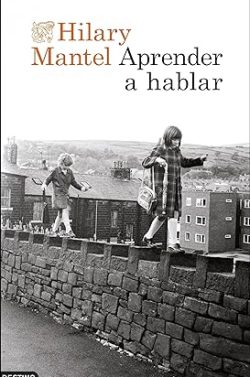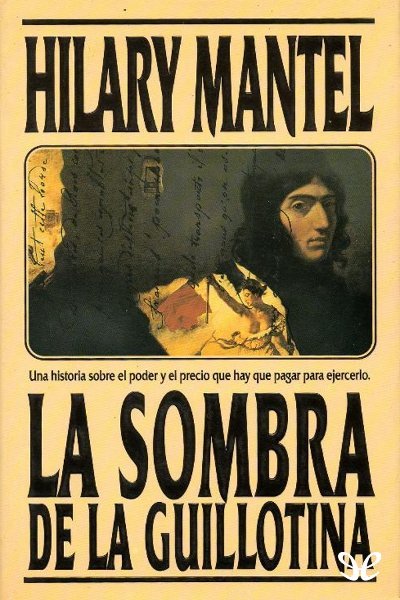oleebook.com
Aprender a hablar de Hilary Mantel
de Hilary Mantel - Género: Ficcion
Sinopsis
Una colección de relatos de deslumbrante calidad literaria publicada por primera vez en EE. UU, con un nuevo prólogo de Hilary Mantel, meses antes del fallecimiento de la autora. «Su brillantez, finura y humor sagaz me obsesionan», Margaret Atwood Hilary Mantel nos ofrece una deslumbrante colección de relatos de corte autobiográfico que, ambientados en la Inglaterra de los años cincuenta y sesenta, retratan esas conmovedoras experiencias de la infancia que nos cambian para siempre: la muerte de una mascota, la separación de unos padres, encontrar el camino de vuelta a casa o darse cuenta de que los adultos se equivocan. Sus narradores, niños y adolescentes que intentan dar sentido al mundo que los rodea a través de la sabiduría y curiosidad propias de la infancia, se resisten a desprenderse de ambas a medida que entran en la edad adulta. En «Aprender a hablar», relato que da título a la colección, la narradora recuerda sus años de lecciones de elocución, destinadas a salvarla de un acento del norte que delata su procedencia en un nuevo entorno de clase acomodada. Al igual que las demás, esta historia brilla por su calidad literaria a la vez que comparte ese gusto por lo insólito y el siempre sutil sentido de la ironía de las novelas de Hilary Mantel.
Descargar
Descargar Aprender a hablar ePub GratisLibros Recomendados - Relacionados
Reseñas Varias sobre este libro
3.5 stars
I enjoy reading a collection of short stories while I have another book going. Ill read a story every other night or so before closing my eyes. If its a new-to-me-author, I also get a sense of whether Id to read one of his or her novels in the future. That was the case here. I know loads of friends have read and gushed about Hilary Mantel. So far I havent had the pleasure. So when I saw this on the bookshelf at the library, it seemed the perfect opportunity.
I cannot get out of my mind, now, the village where I was born, just out of the curl of the citys tentacles. We were too close to the city for a life of our own.
The result is that I know for sure I need to read the first book in Mantels trilogy, because she has such control of language. Without a doubt, shes a master wordsmith. At the same time, I had trouble remembering any of the stories clearly after finishing. Now, two weeks after reading the last story, Im having even more difficulties bringing them to mind even after looking at my highlights. But this is not Mantels fault. Ive come to realize that when Im being pulled mentally and physically in a number of different directions, I cannot focus on short stories or essays. My son moved to NYC at the end of May for a temporary assignment, my daughter graduated high school (add all the stuff that accompanies that rite of passage!), my son moved back out of NYC into another new apartment, and my daughter moves to Toronto in two weeks! Phew! I need something with a prolonged plot that will keep me grounded a bit more while Im feeling overly distracted.
In any case, Im clearly not telling you much about the book, so Ill let the author tell you a bit, as she notes in the Preface:
So I would not describe these stories as autobiographical, more as autoscopic. From a distant, elevated perspective, my writing self is looking down at a body reduced to a shell, waiting to be fleshed out by phrases. Its outlines approximate mine, but there is a penumbra for negotiation.
I had to remind myself of those words, because I often fell into the trap of thinking this was a memoir. There is even one story in which the author uses the term boy in reference to the main character, which I assumed to be Hilary Mantel as a child. Thats when I had to re-read that Preface. In any case, she does a bang-up job of describing setting, especially of some places I love to read about. It brought to mind some of Daphne du Mauriers vivid landscapes.
Moorland was featureless except for its own swell and eddy, its slow waves of landscape rising and falling, its knolls, streams and bridle paths which ran between nowhere and nowhere; its wetness underfoot, its scaly patches of late snow, and the tossing inland squall that was its typical climate.
Then there was both the thrill and confusion of childhood. The planes of existence between children and adults seemed two entirely different places on earth. I remember those days myself. The world that grownups inhabited was something entirely separate from my own, except when it came to the fact those adults inserted themselves into my own, of course. Their disappointments, judgments and beliefs were projected into my world. Any happiness seemed mysterious and something they kept closer to themselves. If only we had the luxury of ruling our own innocent lives for a time!
There should be support groups, a twelve-step program, for young people who hate being young. Since I was at other peoples mercy, I did not care what I did, go to Miss Webster or whatever. Its only later that you think about the years wasted; if I had to have a youth, I wish now it could have been misspent.
Thanks for the introduction, Ms. Mantel. Ill give you the attention you deserve next time around!
contemporary-literary european-literature short-stories108 s14 comments Jan-Maat1,603 2,192 Read
I only picked this up because it was short and I recognised the author's name. I don't recommend it unless you are trying to write about your childhood and want some ideas on how to go about it, or unless you know nothing about Mantel's childhood and are curious about her childhood traumas and dramas.
I saw a documentary about her years and years ago, though that had more to say about her first school. Some of the seven stories here approach the material through fiction, some seem to be more autobiographical. Perhaps it is unjust but I did have the heartless suspicion that this slim volume came from somewhere close to the bottom of the Mantel barrel, pieces that she found while clearing out her desk drawers maybe, they cover quite a stretch of time - in terms of their dates of composition. They are polished and finished pieces, but homeless.
I felt all of the stories had at least some great lines, but this was a book(let) that I read between more demanding tomes and I can imagine that it slipped between the cracks of my consciousness. Which is why they say "Mind the gap" on the London Underground.
I d seeing her waiting as a schoolgirl at the bus stop with a bag full of library books about Latin American revolutions, the ghost of the future writer of a place of greater safety shimmers into perception.
And that struck me, this is a haunted collection of stories, thick with ghosts and spirits, the ghosts of other potential selves lost down the roads not taken - which is something that I feel too in my own life, and unfriendly spirits that live in bushes on the way to school or in rooms of the house. Her childhood world is alive, but not with the sound of music, or at least possibly only with ominous tunes.
This adds to reading her novels, when we start to meet all of those kinds of ghosts in the Wolf Hall trilogy they are nothing new to Mantel, she was just expressing on paper part of her earliest consciousness of the world.21st-century autobiography-memoir fiction ...more31 s2 comments Jeanette3,604 711
This is a HUGE window into Hilary Mantel. It's her self-reveal. Part memoir, part imagination, part autobiography- but all her ERUDITE word placements and flow.
For me this series of short works was a 4.5 star read. None of them were bad, under a 3 star. "King Billy Is A Gentleman" (the first short of the book) was a 3 star for me. That and the last one in the book were the only two which didn't rise to nearly or at a 5 star level. You could tell that King Billy story was one (story) started in her youth, IMHO. It holds the habit of writers writing too "hard" that beginners who rise to great usually exhibit in their early days. I have noticed. It's when the metaphor or descriptive or phrasing get over the top for depth of difference. Hard to describe but I sure can recognize it. Writers "trying to be Faulkner" I call it.
The last one was her summation reveal. It's emotional. She is best without emotion reigning, IMHO. showing or doing instead of telling. "Destroyed" or "Curved Is the Line of Beauty" perfect 4 star examples.
Regardless the book was a gem, a treat, a lovely interlude. I scarfed it down in one sitting. And then reread one or two. "Learning to Talk" is a 5 plus. Most of the middle ones are 5 stars. Her pure deep knowledge of English words (get your dictionary out- they are mighty and don't assume the internet has some of these either) with particular crux placements! Hilary Mantel is the only writer I can think of off the top of my head that forces me to look up words. Some almost lost, others rarely used. But precise and which put the feeling / identity core of Hilary herself smack dab central. Almost. There is pickaboo hiding Hilary also when it stops just short.
What a unique original she is. With whatever English accent she uses. I would LOVE to hear her speak. There are only 2 or 3 writers I would LOVE to know and be friends with to trusting. Hilary is one.
And this book exposes herself to the world to a 5 star degree. Even with the pickaboo trait inclusive. What an UNUSUAL childhood family situation for that placement/time. Her Mother must have been as mighty and as central HIGH self identity as Hilary is herself. To do that switching so visibly in that era and PLACE! Don't forget we are early mid-twentieth century. Hilary and I are nearly the same age. I do know.
And having both men living in the house at the same time for a couple of years? No wonder that she and her Mom had the situation so evident in the story "Third Floor Rising".
Read this one. Hilary AND her mother are after my heart. Sisters under the skin. But my vocabulary is not in the same universe. Not in English or any human language.
Almost forgot! Read the Preface for sure. Oftentimes I skip those to take material head on without influences. But this time it starts to open the window a bit to understand all the air.21 s1 comment Kevin Lopez (on sabbatical)85 22
My territory was shrinking All I owned was the space behind my ribs. And that, too, was a scarred battleground; the site of sudden debouchments and winter campaigns...
Potent in its vulnerability, enduring in its ephemerality, made weighty and immutable by the very dint of its fleeting and fugitive momentariness, this masterful collection of semi-autobiographical short stories (emphasis on the semi in semi-autobiographical), Learning to Talk is the most recent offering from the ever-impressive, multiple Booker-Prize-winning novelist and peerless prose poet, Hilary Mantel. The term Mantel herself uses to describe the unusual literary space inhabited by these stories is, in fact, neither autobiographical, nor semi-autobiographical, but the visually striking and quite deftly readapted term, autoscopic.
(Wikipedia defines autoscopy as the experience in which an individual perceives the surrounding environment from a different perspective, from a position outside of their own body. [It] comes from the ancient Greek autós (?????, "self") and skopós (??????, "watcher").)
Since this particular word choice is both distinct and unorthodoxand because Mantel is nothing if not a consummately meticulous wordsmithI think a quick look at its meaning, sense, and signification could offer better footing for a deeper qualitative understanding of the work. Though in suggesting said quick look I shall momentarilyand shamelesslyoutsource the acquisition of intellectual avoirdupois to Wikipedia for the clout I require to confer credence to such a claim.
And so:
Autoscopy [ ] is abundant in the folklore, mythology, and spiritual narratives of most ancient and modern societies.
According to neurological research, autoscopic experiences are hallucinations.
Autoscopic experiences can include non-mirroring real-time images
[Autoscopic] experiences are characterized by the presence of the following three factors:
- disembodimentan apparent location of the self outside one's body;
- impression of seeing the world from an elevated and distanced, but egocentric visuo-spatial perspective.
The article (which is truly fascinating; if you have any interest in reading it for yourself, heres the link: https://en.m.wikipedia.org/wiki/Autos... ) goes on for a while longer, and though its very interestingand offers even more info which can be interpreted as relevant to Mantels distinct use of the term, I think thats probably enough copying-and-pasting for today.
In case its not already obvious, I rather Mantels new coinage here. With its novel implications and as-yet unkenned subcurrents, it suffuses an old term with new fertility, creating potential for innovation and opening new vistas and literary horizons for all writers, particularly memoirists, autobiographers, and writers of autofic (which would seem to be a preexisting subsetor possibly superset?of Mantels concept of autoscopy).
As adherents of Edward Sapir and Benjamin Lee Whorf are already acutely aware, the introduction of a new word or phrase (or of a novel meaning to an already-extant word) to the lexicon adds not only a new layer of understanding to our descriptive powers, but alsopotentiallyan entirely new mode of cognition itself; of apprehending and interacting with the world outside our minds; of original, untried potentialities for inventiveness, innovation, and sui generis genesis.
For Mantels own purposes, more specific and more circumscribed, the word autoscopic does its duty by subtly implying both a fresh perch from which the author can perceive her yesteryears; and, through the vantage of previously unfamiliar lines-of-sight and radically shifted perspectives, a place from which memory can be freshly interrogated, and thus yield novel results. (It also suggeststo me at leasta telescoping effect on plot, narrative, character constructionand deconstructionpacing, style, et cetera )
Each short tale captures, with breathless efficiency and immediacy, what feels the quintessence of (quote-unquote) England. Specifically Northern England, and specifically Northern England as it existedand as it still exists, in the memory of those who lived then and there. That is, between the postwar years androughlythe 1970s. Each story encapsulates this transient, long-agoand yet eternal and right-nowplace and time so boldly that even a reader myself, who has never even been to England (for my sins and pray your pardon) can still have the sensation of an almost eidetic experiencea cognitive resonance thatimpossibly, yes, yet somehowfeels akin to actual, experiential remembrance. In other words, those subjectively-felt, impressionistic reservoirs of memory, reminiscence, and capital-T Time.
All of this is touched and flavored by the poignancy of Mantels imagism; firmly possessed of a poetry which runs far deeper than our collective pools of conscious thought.
Each story is expertly (and thus invisibly) imbued by Mantel with the ghostly, gossamer-light glimmerings of childhood, nostalgia, memory, regret, and pain. These stories are gentle, and brutal, in their dispassionate deconstruction and dissection of innocence (and lost innocence), and of that inescapable sense of crushing betrayal which inevitably accompanies both states of being.
Mantel is a supreme lyricistperhaps the most talented and effortlessly brilliant contemporary fiction writer I could easily name. Her ear for the pure musicality of language is at once supreme and devastatingly efficacious. Her skill at weaving deep intimacy and pathos into her characters is unsurpassed.
But! And there is a but.
Her true forte is the novel. Its length seems to give her the space she needs to breathe real life into her characters; to suffuse her stories with the seesaw-sense of existence on the edge of nonexistence that is both essential and peculiar to her style; to bring her immensely ambitious sense of atmosphere to structural, visuo-spatial (see above) fruition.fiction-shortform15 s Cathérine340 71
**** 1/2
Mantel is top!
Als je nog nooit iets van Hilary Mantel gelezen hebt, is dit misschien wel de ideale starter. In deze kortverhalen maak je kennis met de virtuoze schrijfstijl van Mantel én aangezien de verhalen deels autobiografisch zijn, ook met haar achtergrond. Bijzonder taalgevoelig maakt ze moeilijke onderwerpen schijnbaar luchtig en licht door de humor die ze in haar zinnen verweeft.
In zes van de zeven verhalen, zijn de hoofdpersonen kinderen. Kinderen die zich eigenlijk nergens echt thuis voelen, vroegrijp en intelligent doorprikken ze vrij snel de leugens van de volwassenen. Het zijn kinderen die gepest worden, uitgelachen voor hun accent, hun geloof, hun klasse, er zijn ouders die uit elkaar gaan, er is agressie, er zijn absurde situaties. Kortom, kinderen met een allesbehalve zorgeloze jeugd, net zoals Mantel zelf. En toch, ondanks de zware ondertoon heb ik meermaals hardop moeten lachen of grinniken.
Mantel schrijft meesterlijk, je voelt gewoon aan hoeveel plezier ze in schrijven schepte. Het is hartverscheurend dat ze veel te vroeg overleed én dat ze nooit de Nobelprijs voor literatuur kreeg, een erkenning die ze dubbel en dik verdiende.
10 s Elena855 325
Hilary Mantel ist eigentlich für ihre umfangreichen, meist etwa 500 bis 800 Seiten langen Bücher wie die Tudor-Trilogie bekannt, mit "Sprechen lernen" liegt nun jedoch auch ihre Kurzgeschichtensammlung, in der Übersetzung von Werner Löcher-Lawrence, auf Deutsch vor. Die sieben autofiktionalen Geschichten wurden 2003 von der Autorin erstmals veröffentlicht und spielen im England der 50er- und 60er-Jahre. Sie verarbeitet darin literarisch ihre eigene Kindheit und Jugend, berichtet vom Verschwinden des leiblichen Vaters, dem Liebhaber der Mutter, dem allmählichen, hart erkämpften sozialen Aufstieg und der damit verbundenen Häme und Ausgrenzung sowie der Last des Verlustes, die auf der Jugend liegt. Die Storys sind düster, sowohl inhaltlich, als auch die Schauplätze betreffend: graue Städte, Moore und Schrottplätze bilden das Setting für Mantels Figuren.
"Sprechen lernen" war meine erste Berührung mit Hilary Mantel und ich muss zugeben, dass mir ihr Stil nicht wirklich zugesagt hat. Die Geschichten haben mich wenig gefesselt, obwohl sie thematisch durchaus interessant sind und ich ab und zu gerne gesammelte kurze Erzählungen lese. Vielleicht war es die Trostlosigkeit, die die Storys in meinen Augen vor allem ausstrahlen, die mir missfallen hat. Mit ihren preisgekrönten Romanen "Wölfe" und "Falken" möchte ich es irgendwann trotzdem gerne nochmals versuchen.9 s Rebecca3,843 3,172
(2.5) Last year I loved reading Mantels collection The Assassination of Margaret Thatcher. In comparison, these six first-person stories felt autobiographical castoffs. (They were individually published in various periodicals between 1987 and 2002 and then collected as a follow-up to her memoir, Giving Up the Ghost, an excerpt from which* closes this book.) We get a childs perspective on village life in the North of England with a lodger, a stepfather and a mean dog. My two favorites were the title story, about taking elocution lessons, and Third Floor Rising, about an 18-year-olds first job in a department store.
*My favorite line was from this: The story of my own childhood is a complicated sentence that I am always trying to finish, to finish and put behind me.
Originally published on my blog, Bookish Beck.autofiction public-library reviewed-for-blog ...more9 s JoBerlin343 38
Ich liebe Hilary Mantel, ihr plötzlicher Tod in 2022 hat mich sehr berührt. Der DuMont Verlag bietet mit Sprechen lernen nun allen Fans Trost und Neueinsteigern die Möglichkeit, die Autorin in Erzählungen zu entdecken. Beeindruckend ist wieder die exzellente Sprache Mantels, die sehr gute Übersetzung von Werner Löcher-Lawrence hat Anteil daran.
Die sieben Geschichten, die sich mit Kindheit und Jugend jeweils wechselnder Protagonisten befassen, spielen alle in den 50er und 60er Jahren in Nordengland und sind von eigenem Erleben der Autorin beeinflusst. Die triste Nachkriegszeit , der Verlust des Vaters, der neue Stiefvater sind prägende Einflüsse. Der Zusammenhang zwischen Lebensort, Bildung, Einkommen und daraus resultierender Sprache wird ganz deutlich.
In der Titelgeschichte Sprechen lernen nimmt die Erzählerin, um ihren nordenglischen Dialekt zu glätten, Sprachunterrichts bei einer Ex-Schauspielerin, die allerdings selbst unter einem Manchester-Akzent leidet. Rund ist die Schönheit ist eine Geschichte über Liebe und Freundschaft, Glauben und eine Beinahe-Katastrophe auf einem Schrottplatz. Und in Hoch in den dritten Stock sieht die Erzählerin verblüfft zu, wie sich ihre Mutter als Kaufhausangestellte ganz neu erfindet.
Mantel schreibt nie zu viel und lässt ihre Protagonisten sich nie ganz offenbaren, knapp schildert sie oftmals nur kleine Veränderungen, die doch das spätere Leben beeinflussen. Sie zeigt damit auch Orientierung für das eigene Leben auf, das gerade erst beginnt: Aufstehen, Vorwärtsgehen, Weiterkommen und die Geister der Kindheit hinter sich lassen - auch wenn wohl niemand diesen je ganz entkommen kann.
20238 s Buchdoktor2,018 151
In 7 Kurzgeschichten folgt Hilary Mantel in chronologischer Reihenfolge dem Heranwachsen eines Kindes, das nicht ausschließlich in weiblicher Rolle auftritt. Die Orte wären real, die Inhalte dagegen autoskopisch, jedoch nicht autobiografisch, betont die Autorin und sie hätte diese Mosaikstücken jahrelang hin und her geschoben. Die Pfeiler der Erzählungen (düstere, graue Industriestadt im Raum Manchester, ein öffentlich verschwiegener Stiefvater, Katholizismus, Dorftratsch, Zumutungen der Schuldisziplin und als traumtisch empfundener Umzug an einen anderen Ort) entsprechen den Pfeilern in Mantels Autobiografie Von Geist und Geistern. In King Billy ist ein Gentleman geht der Vater des Icherzählers eines Tages wortlos und ein Untermieter zieht ein, ein schwieriger Mensch, dem der Junge mit der Geduld eines Vogelbeobachters zu begegnen versucht.
Von der zweiten Story an erzählen Mädchen aus der Ichperspektive und es entfalten sich Rätsel im Kinderleben, warum Mütter alles wissen, z. B. wie Frauen vor ihrer Heirat hießen. Als dieses Mutter-Kind-Untermieter-Duo umzieht, symbolisiert der rüpelhafte Familienhund die Kluft zwischen bürgerlicher und Arbeiter-Schicht. In Rund ist die Schönheit leben Mutter und Kind wieder in einer skandalösen Beziehung mit zwei Vätern. Der Sohn erfährt, dass Jack außerhalb der Familie Daddy genannt werden muss und dass man Jacks Freund Jacob nicht als schwarz beschreiben darf. Sprechen Lernen befasst sich mit der jahrelangen Umerziehung des Dorfkindes, das nach dem sozialen Aufstieg zu provinziell spricht, so dass jeder gleich die Herkunft aus dem Norden und dem Arbeitermilieu bemerkt. Hoch in den dritten Stock befasst sich mit dem sozialen Aufstieg der Mutter in einem Kaufhaus und dem Rätsel, wie die drei Kinder der Familie einander in der Rolle des behüteten, kränklichen Kindes ablösten. Wunderbarerweise war jedes Mal das behütete Kind überraschend gesundet, wenn ein Geschwister geboren wurde. Ein reiner Tisch schließlich stellt die Frage, wie man seine Erinnerungen beisammen halten kann, wenn der Heimatort durch einen Staudamm-Bau im Wasser versunken ist. Die letzte Story ist ein Ausschnitt aus Von Geist und Geistern".
Die Stories lassen sich als Ergänzung zu Mantels lesenswerter Biografie wahrnehmen, als Entwicklungsgeschichte aus den 50er/60er Jahren lesen, oder man kann darin erforschen, in welchem Alter Mantels Icherzähler:innen Sinn für Ironie entwickeln und was uns das über die Autorin zeigt.7 s Vicky "phenkos"147 124
I got the book from the library without realising that this is a companion volume to Giving Up The Ghost. It's possible I would have had a different view of the book had I read both volumes together. As it is, however, I didn't enjoy the short stories at all. I found them too disjointed centred as they were around childhood memories that seemed trivial. The only story that caught my attention was 'Learning to Talk" as this had a clear and relatable theme, namely how 'talking' (accent, delivery, pronunciation) can make or break you in this world of ours where language is authority. But I still could not fathom the meaning of the shoes episode. Why place so much emphasis on the shoes the character was given to wear at her exam? I'm sorry, I don't get it.7 s Ellie1,533 403
I enjoyed these stories--all of them which is not all that usual for me in a collection. Some I loved, "Curved is the Line of Beauty," "Learning to Talk" especially.
I didn't realize this was a companion volume to Giving Up the Ghost so I'm off to get a copy of that!2022-ind-chal bio-memoir library ...more6 s Nilu542 34
Dame Hilary Mantel Passed Away on 22nd of September,2022.
A couple of days or one week before her death , one of my bookworm pals commented about finishing the Cromwell Trilogy. I responded by saying that I have no intention to start on 3 bulky books this year.
However, I encountered a post on one of her short story collections and decided to at least read that.
For some reason , I always find myself reading stories about the British working class, especially the blue collar workers.
I dont specifically venture out for that type of stories but somehow by sheer chance or other unknown reasons those stories find me. This was one such happy accident.
Learning to Talk is the first short story collection by Ms. Mantel.
All stories in the anthology are narrated by an adult looking back on his or her childhood. Class and other socio political issues are discussed in the mosaic of each story. Theres a universal feel to them even though the stories are based in a northern English village.
It is also believed that each story is semi autobiographical.
What attracted me most was her lyrical and descriptive writing style. It was easy to conjure up the surroundings described in the book while reading.
She had a wonderful way to describe feelings too.
Hope, fine as cobwebs, draped our bare arms and floated across our shoulders, each strand shivering with twilit blue.
As a reader I could almost picture that fleeting delicate feeling of hope.
Learning to talk was a great reading experience where I could consciously enjoy the written word.
Recommended to fans of her other work and anyone else interested in the author.
I still dont feel attempting the Cromwell Trilogy but I would definitely try a different book by the author.
Thank you Dame Hilary Mantel for your wonderful contribution to the world of literary fiction.
I wish your soul a Peaceful Eternal Rest.6 s kiki165 3
??? ????????? ?????. ??? ????? ?????? ????????? ??? ?????????, ?? ???-???? ?????? ??????. ???? ? ???? ???????? ???????? ???-?? ???????? ? ??? ????? ??????.
?????? ??????? ?????????? ???? ???????. ??????? ????? ???? ?????? ?????????, ?? ???? ?? ? ???????? ????. ?? ?????????? ????? ????? ??, ????? ?? ?????????? ?? ???? ?? ???? ??????????. ????? ?? ??? ?????????? ????????? ?????????, ?? ???? ????? ????????? ???? ????????, ?????? ?? ?? ??????? ??? ????. ?????? ?? ??? ? ?????? ???????? ??????????? ??????, ? ???? ????????? ???? ? ????? ??????? ? ??????????, ??? ??, ? ?????????? ????? ??? ??.
???-?? ?????, ??? ??? ??????? ????? ??? ?????????? ? ????????, ? ???? ?????? ?? ????? ????????, ? ?? ? ????????????? ???????? ? ??? ???-?????? ???????.read-20245 s Aaron Brown79 8
Any reader of contemporary literature will ly know Ms. Mantel, who is most well known for her fantastic trilogy of historical fiction beginning with Wolf Hall. For anyone interested in Ms. Mantel and her writing, or even looking to be introduced to her for the first time, this short collection of short stories is highly recommended. There are seven stories, focusing on youth and childhood and, as Ms. Mantel indicates in her Preface, they are somewhat auto-biographical. The stories incorporate so much detail of the period and setting, much Ms. Mantel's prior works of historical fiction, and they are a wonderful read. I love short stories as a form and Ms. Mantel proves she is as skilled with this format as she is the novel. Definitely recommended, especially for fans of Ms. Mantel who will enjoy the insights into her childhood and early life.5 s Lisa208 21
This collection of short stories chronicle growing up in the 1950s and 1960s in northern England. Odd neighbors, gossipy coworkers, teens with angst, hypochondria, and religious prejudices all characterize this era. The title story is the most poignant as the main character attempts to wrestle her northern accent into a form of RP, but overall the style is a bit too literary for my tastes. Fans of Mantel's larger works may find her writing style more accessible.
Thank you to NetGalley and the publisher for the advance copy of this book in exchange for my honest review.5 s Annabel Holland35 1 follower
Was good and all, Hilary Mantel just be writing about the same stuff in different places. I see her3 s Linden1,027 17
Largely autobiographical stories about the author's childhood and adolescence.3 s Red344 55
I was mid-way through this book when I heard the sad news that Hilary Mantel had died. She was a literary powerhouse who crafted stories with unique poetry and flair. I have dog-eared many, many pages of this slim volume to mark eloquent passages.
*I won an ARC of this book in a Goodreads giveaway. fiction giveaways short-stories3 s KarenAuthor 67 books4
these stories are told from the perspective of growing children, children older than their years because their lives, their circumstances, the flawed and fragile people around them, have necessitated it. yet nothing is a trite coming-of-age tale. Hilary Mantel writes prose eloquent, surprising, beautiful - and humorous - and the characters and cultures of Manchester and the English north, also the past, rise eerily to life.
oh, and she has so many memorable lines:
"Our huddle of stones and slates, scoured by bitter winds and rough gossip tongues, had no claim on rural England, where there is morris dancing and fellowship and olde ale flowing. It was a broken, sterile place, devoid of trees, a transit camp; and yet with the hopeless permanence that transit camps tend to assume. Snow stood on the hills till April."
"Even in mild weather its air was wandering, miasmic, memories that no one owns."
"You had to make categories for the garments that had no name, the bifurcated items that head office had sent several seasons ago; made of hairy grey-blue tweed, they were some kind of flying suit perhaps, of a kind to be worn by Biggles's nanny."
"I didn't want my mother to incur even more rancid female hatred, that would snarl invisible about her ankles, snag her kitten heels when I was long gone and marching through London streets."
"...folding away the morning paper with a phrase half read, an ellipsis that would last their lifetimes."
"...what sort of family do you expect me to come from? All-singing, all-dancing? You'd just know they'd be tubercular, probably syphilitic, certifiably insane, dyslexic, paralytic, circumcised, circumscribed, victims of bad pickers in identity parades, mangled in industrial machinery, decapitated by forklift trucks, dental cripples, sodomites, sent blind by measles, riddled with asbestosis and domiciled downwind of Chernobyl."
"I put my head on the clear, clean plaster of the wall, which was painted in a neutral shade, thought."literary-fiction short-stories3 s Kirsty2,724 175
Read for my last participation in Dewey's 24-Hour Readathon
Short stories are always good for a readathon, and when I spotted Mantel's collection in my University library, I just couldn't resist taking it away with me. I really enjoy her writing on the whole, and there are some absolute gems here; indeed, I absolutely loved the first story, and a couple of the later ones almost matched its wonderful pace and intrigue. Some did not quite live up to the brilliance of others, but the thematic element is strong in that these are all tales of childhood; of finding one's voice, and of finding oneself. A quick read, but a thoughtful and thought-provoking one.borrowed october-20166 s Jill S352 323
4.25fiction short-stories2 s Betsy D342 2
I thoroughly enjoyed this collection of 7 (I think) short stories by this excellent writer. They are based on her own childhood in a somewhat bleak region of northern England. I had some idea of what was accurate to her life, having read her memoir Giving Up the Ghost.
There is some satire, especially in the story Learning to Talk, sending a few darts into my wish that we (Americans and other English-speakers) all talked "proper." A quick read.2 s Clare Kirwan268 3
This short collection of (semi?)autobiographical stories offers vivid vignettes of herself as impish child enduring a comically bleak Lancashire childhood. I remain in awe of her writing - a perfect combination originality, wit and truth. 2 s Annie446 38
I decided to read her short stories as a way of honoring this acclaimed writer on her recent passing. I enjoyed this insight into her life and find her style adept. Maybe Wolf Hall and Giving up the Ghost are in my reading future. 2 s Tineke28
A must, of course, for fans of Mantel, her last book. It is a collection of stories about her childhood and teenage years. Quite depressing at times, and negative. But she has a wonderful, unique and recognizable style, so four stars from me.2 s Denise25
I received this book as an ARC from Henry Holt & Company.
Ms. Mantel is a marvelous writer. She is able to evoke atmosphere and mood so vividly. The stories are interesting and moody. They make me think of old black and white photographs the interesting ones always leave me with questions. These stories will stay with me. 2 s Diarmaid de Paor56
Beautifully written, wistful and so so sad at the root of it all. This collection of short stories, clearly autobiographical in origin are moving and heart-breaking in the way that only a child's distress and loneliness can be. 2 s Helen323 1 follower
Precise, sort of agonising, beautiful. I think of all the writers I love, Hilary Mantel is the one I would most to be best friends with. 2 s Samantha Harding51
This read very poetic, which I really d. As a whole it just kinda leaves you there with everything which I guess was kind of the point.2 s Vivek TejujaAuthor 2 books1,344
Autor del comentario:
=================================








